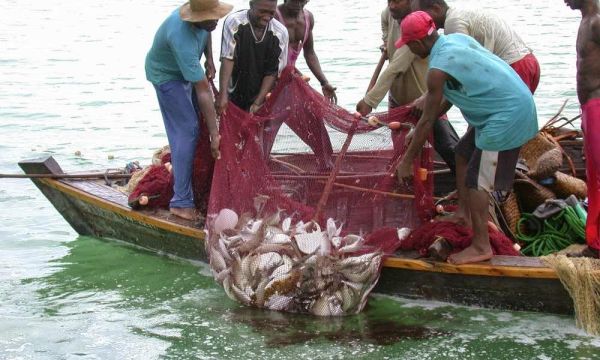Fishermen and other fishing industry stakeholders across the country have welcomed the automated fuel outlets, commending the Ministry of Fisheries and Aquaculture Development for the effort to reduce abuse and waste in the supply chain.
They said the new system would better the livelihoods of fisherfolk.
The Vice-President, Dr Mahamudu Bawumia, last Tuesday simultaneously inaugurated 50 automated premix fuel dispensing and monitoring outlets, using three sites at Elmina to symbolically mark the inauguration of the facilities across the country.
The project is expected to transform and redefine the landscape of the fishing industry and usher in an era of efficiency, transparency and accountability.
Dr Bawumia said the project was an indication of the government’s commitment to leverage its digitisation agenda to grow the economy.
Impressions
A fisherman, Kwesi Ashie, said he was excited about the premix fuel automation project because the “kalabule” in the sale of premix fuel was worrying.
“With the automated system, fishermen can purchase premix fuel with a card without stress. We have suffered enough at the hands of middle men. They buy the fuel as middlemen and sell it at higher prices to us. This increases the operational cost and we get nothing. Thank God it is all ending,” he said.
Another fisherman, Kofi Acquah, said it had come to ease the burden on canoe owners.
“When the premix fuel gets to the community, the ‘connection men’ will take over the fuel and sell it at their own prices, so the automated system is better for us fishermen,” he said.
Chief fisherman
The Chief Fisherman of Elmina, Nana Badu, urged fishermen to get their registered biometric identification cards for an easy and safe distribution process.
He appealed for more supplies of premix fuel for the outlets, commended the ministry and its partners for the project and assured that fishermen would take good care of the facility.
Fish is a major source of animal protein in the country, with a per capita consumption of fish being 26 kilogrammes (kg), far exceeding the average of 15kg for West Africa.
Fish contributes significantly to national food and nutrition security in Ghana.
The Executive Director of Hen Mpoano, a civil society organisation promoting sustaining fisheries sector, Kofi Agbogah, stated that the automation was good for monitoring of the premix.
He, however, called for the premix Legislative Instrument (LI) 2233 to be revised to reflect the restructuring, looking at the profit-sharing formula at the landing beaches.
“What will be the relevance of the national premix committee if premix can be deposited at gas stations just like petrol and diesel,” he queried.
Mr Agbogah, who is also a fisheries consultant, called for the removal of persons whose activities were fraught with corruption and political patronage for the system to operate well.
For his part, the Convenor of the Fisheries Alliance, Kyei Kwadwo Yamoah, indicated that the new premix automation system was very good in many ways.
“It is designed to address challenges of the old premix fuel distribution system, including preventing diversion of the premix fuel, reducing hoarding of the product to create artificial shortage and price hikes and preventing protocol sale of the product where individuals who were not fishers received the premix fuel but the actual fishers did not get access,” he said.
Mr Kyei, who is also a Programmes Officer of Friends of the Nation (FoN), further stated that the system would also address issues where distribution tankers distributed less volume of fuel to communities.
“The government has provided automation cards to fishers. The card is biometric and has the data of the fisher and his fishing canoe and gears, so by that, the actual quantity required by the fisher can be identified by the new automation system to guide over sale or under sale. It is good,” he added.
Significant step
The Canoe and Fishing Gear Owners Association of Ghana (CaFGOAG) commended the MoFAD and the National Premix Fuel Secretariat for automated systems.
The President of CaFGOAG, Nana Kweigyah, stated that “we see the project as a transformative and significant step towards addressing the longstanding irregularities in the distribution of premix fuel at landing beaches.
“For years, the premix fuel distribution at landing beaches has been marred by irregularities, including hoarding by individuals who do not own canoes or fishing gears, which has led to the sale of premix fuel at prices well above the government-mandated rates and negatively impacting the sector,” he stated
He said canoe owners were optimistic that such irregularities would be curbed with the new system.
“With the automated system in place, it is important for MoFAD and the NPFS to relook the establishment of the Landing Beach Committees (LBCs) to bring sanity in the management and distribution of premix fuel at the landing beaches,” Nana Kweigyah stated.
The current composition of the LBCs, as specified in LI 2233, involves the chief fisherman as the chairman, representatives of canoe owners, fishmongers, the district assembly and a fisherman nominated by the ministry in consultation with the district assembly.
Additionally, the committee is required to have a secretary and a pump attendant.
However, Nana Kweigyah observed that due to the non-adherence of the LI, the LBCs were formed without the appropriate representation as specified in the law.
Source: graphic.com.gh
| Disclaimer: Opinions expressed here are those of the writers and do not reflect those of Peacefmonline.com. Peacefmonline.com accepts no responsibility legal or otherwise for their accuracy of content. Please report any inappropriate content to us, and we will evaluate it as a matter of priority. |
Featured Video















